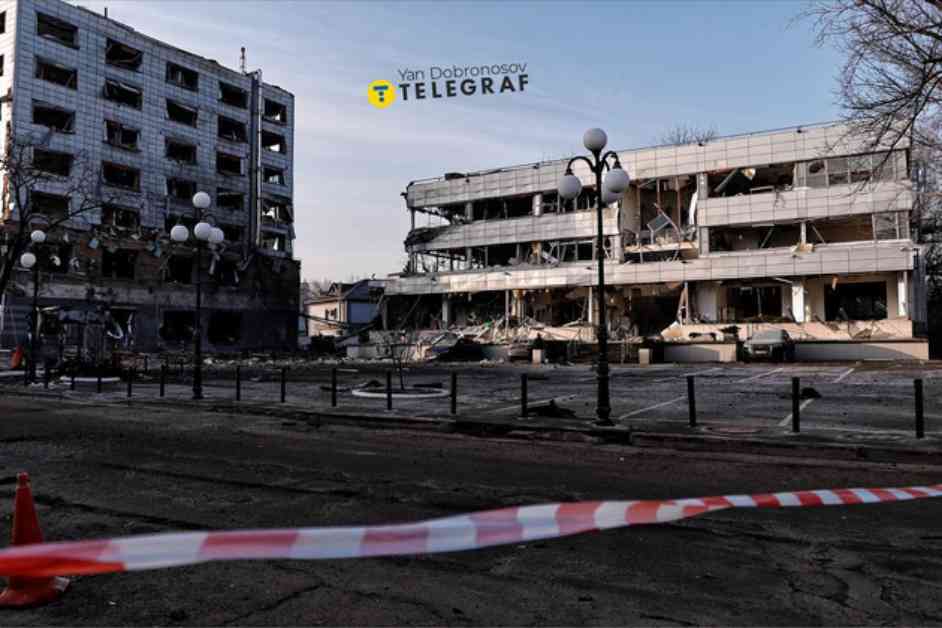President Volodymyr Zelensky of Ukraine expressed grave concern following a deadly Russian drone and missile attack in Kyiv, emphasizing that the Kremlin’s actions indicate a lack of interest in peace efforts. The capital city was rattled by a series of explosions, with the aftermath revealing a tragic scene of destruction and loss. Among the casualties was one individual, their body shrouded in a black plastic sheet amidst debris-strewn streets.
Zelensky reported that the assault resulted in one fatality and injuries to at least four others, including a child. The attack inflicted damage on residential buildings, office complexes, and essential civilian infrastructure, underscoring the devastating impact on innocent lives. In a bold social media statement, Zelensky condemned Russian President Vladimir Putin for failing to prioritize peace, instead opting to perpetrate violence against Ukrainians and ravage urban centers.
The Russian defense ministry claimed responsibility for the strike, labeling it as a “group missile attack” aimed at Ukrainian military-industrial sites specializing in drone production. Despite the destruction wrought by the assault, Russia asserted that all intended targets were successfully hit, further escalating tensions in the region. Zelensky’s impassioned plea for international solidarity resonated, highlighting the urgent need for unified action and unwavering support in the quest for a just resolution to the conflict.
Global Diplomatic Efforts and High-Stakes Negotiations
As the crisis in Ukraine intensifies, diplomatic maneuvers take center stage in a bid to de-escalate hostilities and pave the way for meaningful dialogue. President Zelensky’s upcoming meeting with US Vice President JD Vance at the Munich Security Conference underscores the gravity of the situation and the critical role of international partnerships in addressing the crisis. Against the backdrop of mounting rhetoric from key players, the prospect of negotiations looms large, offering a glimmer of hope amidst the turmoil that has exacted a heavy toll on lives and livelihoods.
US Secretary of Defense Pete Hegseth’s forthcoming visit to Europe signals a concerted effort to rally support from allies and bolster Ukraine’s defense capabilities. The flurry of high-level engagements underscores the urgency of the situation and the imperative of collective action in confronting Russian aggression. With the anniversary of Russia’s invasion looming, stakeholders are under pressure to broker a sustainable ceasefire and chart a path towards lasting peace in the region.
On the Ground Realities and Humanitarian Challenges
Amidst the chaos and devastation unleashed by the recent attack, emergency responders and relief workers sprang into action, mobilizing resources to aid affected communities. In Kyiv, over 120 rescue personnel were deployed to assess the impact of the assault and mitigate the immediate aftermath, including extinguishing fires ignited by the barrage. The resilience and determination of frontline responders underscore the human cost of conflict and the urgent need for swift intervention to alleviate suffering and rebuild shattered lives.
In the Chernigiv region north of Kyiv, reports emerged of critical infrastructure being targeted by Russian forces, exacerbating the humanitarian crisis and imperiling civilian populations. Governor Vyacheslav Chaus’s stark assessment of the situation underscores the far-reaching implications of the conflict on vulnerable communities. The Ukrainian air force’s successful interception of missiles and drones signifies a strategic defense against escalating threats, showcasing the nation’s resolve in safeguarding its sovereignty and territorial integrity.
As the specter of war looms large over Ukraine, the trajectory of the conflict hinges on the collective resolve of global leaders to uphold peace, protect human rights, and advance diplomatic solutions. The road ahead is fraught with challenges, but the unwavering spirit of the Ukrainian people and the solidarity of the international community offer a beacon of hope in the quest for a just and lasting resolution to the crisis.

















